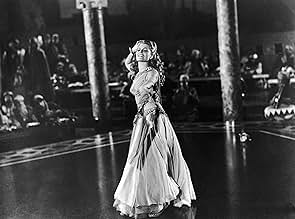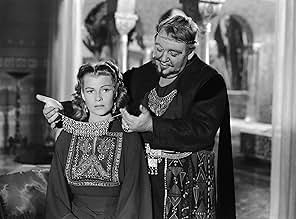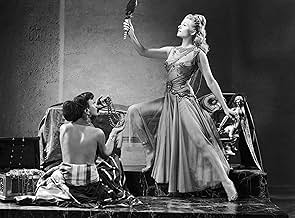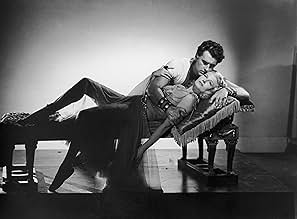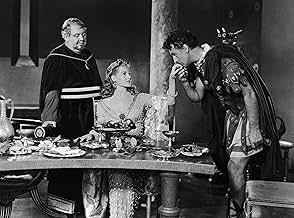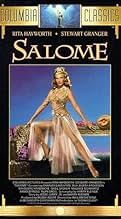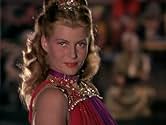IMDb-BEWERTUNG
5,8/10
2419
IHRE BEWERTUNG
Füge eine Handlung in deiner Sprache hinzuAfter her banishment from Rome, Jewish Princess Salome returns to her Roman-ruled native land of Galilee, where prophet John the Baptist preaches against Salome's parents, King Herod and Que... Alles lesenAfter her banishment from Rome, Jewish Princess Salome returns to her Roman-ruled native land of Galilee, where prophet John the Baptist preaches against Salome's parents, King Herod and Queen Herodias.After her banishment from Rome, Jewish Princess Salome returns to her Roman-ruled native land of Galilee, where prophet John the Baptist preaches against Salome's parents, King Herod and Queen Herodias.
- Auszeichnungen
- 1 Nominierung insgesamt
Cedric Hardwicke
- Tiberius Caesar
- (as Sir Cedric Hardwicke)
David Ahdar
- Convert
- (Nicht genannt)
Ray Beltram
- Herod's Council Member
- (Nicht genannt)
Bobker Ben Ali
- Politician
- (Nicht genannt)
Frederic Berest
- Sailor
- (Nicht genannt)
Barry Brooks
- Roman Guard
- (Nicht genannt)
Bruce Cameron
- Guard
- (Nicht genannt)
Eduardo Cansino
- Roman Guard
- (Nicht genannt)
Tristram Coffin
- Guard
- (Nicht genannt)
Bud Cokes
- Galilean Soldier
- (Nicht genannt)
Empfohlene Bewertungen
Epic films based upon the Bible were popular in the 1950s, but sometimes they were only very loosely so based. "Salome" is a case in point. The "damsel" whose seductive dance before King Herod led to the execution of John the Baptist is not actually named in the New Testament, but tradition has identified her with Princess Salome, the daughter of Queen Herodias and the niece and stepdaughter of Herod. She has traditionally been painted as the ultimate Bad Girl, a wanton teenage temptress whose thoughtless cruelty led to John's death.
Well, in this film Salome is no longer a teenager but a mature beauty in her mid-thirties. (Rita Hayworth would have been 35 in 1953). More importantly, she is no longer a Bad Girl. (The studio, apparently, did not want Rita to play a villainess). To begin with, she is proud and independent-minded, but gradually softens under the influence of John's teaching and eventually converts to Christianity. (A "Salome" is numbered among Christ's followers in Mark's Gospel, but this is generally believed to have been a different person). Yes, she still gets to perform her sexy "Dance of the Seven Veils", but her motives for doing so are the precise opposite of those attributed to her in the Scriptures. In this version she is dancing in the hope that she can thereby influence the King to spare John's life.
As the film opens, Salome is living in Rome, where she has lived for most of her life. She has fallen in love with Marcellus, nephew of the Emperor Tiberius, but he forbids their marriage, not wanting a member of his family to marry a "barbarian", and exiles her back to Galilee. Once there she finds herself in a complicated political situation, made more complex by the teachings of the Baptist who condemns Herod's rule and his adulterous marriage to his brother's wife. Herodias is furious, and demands that her husband condemn the Baptist to death for treason, but he is reluctant to do so, believing that he will be cursed if he does; his reluctance makes their already unhappy marriage even more strained. In the meantime, Salome has found a new boyfriend, the handsome Roman soldier Claudius, who shares her interest in John's teaching.
Some later Biblical epics were an odd mixture of godliness and sexiness, combining an improving Christian moral with plenty of bare flesh on display. An example is "Esther and the King" in which Queen Vashti (who in the Bible is banished for refusing her husband's command to "show the people and the princes her beauty") gets into hot water for quite the opposite offence, that of showing them more of her beauty than she should by stripping down to her panties in the Royal Palace. In 1953, however, the Production Code was more rigidly enforced, so "Salome" is, on the surface at least, more godly than sexy. Hayworth's dance is really a Dance of the Six Veils, as she never removes the seventh and therefore remains fairly modestly clad to the end.
Below that surface, however, there is a lot going on. Hayworth, as lovely in her thirties as she had been a decade earlier, was gifted enough, both as an actress and as a dancer, to convey a great deal of erotic allure even when fully clothed, and although the censors could come down hard on any explicit displays of nudity, this sort of subtle sexuality was much more difficult for them to control. "Salome" is far from being Rita's greatest film (that was probably "Gilda"), but that dance is one of her greatest moments. (She later claimed it was "the most demanding of her entire career" as the director William Dieterle demanded endless retakes).
Among the other actors, the best contribution comes from Charles Laughton as the slimily lecherous Herod. Laughton had a tendency to overact, but in a role like this overacting is not necessarily a bad thing. Easily the worst comes from Alan Badel, playing John the Baptist not so much as a prophet as a swivel-eyed religious maniac, the first- century Galilean equivalent of a Hyde Park soapbox preacher. Judith Anderson is good as Herodias, but Stewart Granger is a bit wooden as Claudius, possibly because his character does not have much to do except stand around to provide a love-interest for the leading lady.
"Salome" will never, in my opinion at least, rank alongside the grand epics like "Ben-Hur" or "Spartacus"; there is too much of the smell of cheesy Hollywood sanctimoniousness about it. It does, however, have its virtues, and is certainly better than the likes of "Esther and the King", "The Silver Chalice" or "Sodom and Gomorrah", all of which do not just smell of sanctimoniousness but positively reek of it. It makes enjoyable, if undemanding, watching on a Sunday afternoon. 6/10
Some goofs. Claudius and Pontius Pilate refer to their military service in Britain, but Britain was not a Roman province during the reign of Tiberius. And whatever persuaded the scriptwriter that Gila monsters (natives of Mexico and the American South-West) are to be found in Israel?
Well, in this film Salome is no longer a teenager but a mature beauty in her mid-thirties. (Rita Hayworth would have been 35 in 1953). More importantly, she is no longer a Bad Girl. (The studio, apparently, did not want Rita to play a villainess). To begin with, she is proud and independent-minded, but gradually softens under the influence of John's teaching and eventually converts to Christianity. (A "Salome" is numbered among Christ's followers in Mark's Gospel, but this is generally believed to have been a different person). Yes, she still gets to perform her sexy "Dance of the Seven Veils", but her motives for doing so are the precise opposite of those attributed to her in the Scriptures. In this version she is dancing in the hope that she can thereby influence the King to spare John's life.
As the film opens, Salome is living in Rome, where she has lived for most of her life. She has fallen in love with Marcellus, nephew of the Emperor Tiberius, but he forbids their marriage, not wanting a member of his family to marry a "barbarian", and exiles her back to Galilee. Once there she finds herself in a complicated political situation, made more complex by the teachings of the Baptist who condemns Herod's rule and his adulterous marriage to his brother's wife. Herodias is furious, and demands that her husband condemn the Baptist to death for treason, but he is reluctant to do so, believing that he will be cursed if he does; his reluctance makes their already unhappy marriage even more strained. In the meantime, Salome has found a new boyfriend, the handsome Roman soldier Claudius, who shares her interest in John's teaching.
Some later Biblical epics were an odd mixture of godliness and sexiness, combining an improving Christian moral with plenty of bare flesh on display. An example is "Esther and the King" in which Queen Vashti (who in the Bible is banished for refusing her husband's command to "show the people and the princes her beauty") gets into hot water for quite the opposite offence, that of showing them more of her beauty than she should by stripping down to her panties in the Royal Palace. In 1953, however, the Production Code was more rigidly enforced, so "Salome" is, on the surface at least, more godly than sexy. Hayworth's dance is really a Dance of the Six Veils, as she never removes the seventh and therefore remains fairly modestly clad to the end.
Below that surface, however, there is a lot going on. Hayworth, as lovely in her thirties as she had been a decade earlier, was gifted enough, both as an actress and as a dancer, to convey a great deal of erotic allure even when fully clothed, and although the censors could come down hard on any explicit displays of nudity, this sort of subtle sexuality was much more difficult for them to control. "Salome" is far from being Rita's greatest film (that was probably "Gilda"), but that dance is one of her greatest moments. (She later claimed it was "the most demanding of her entire career" as the director William Dieterle demanded endless retakes).
Among the other actors, the best contribution comes from Charles Laughton as the slimily lecherous Herod. Laughton had a tendency to overact, but in a role like this overacting is not necessarily a bad thing. Easily the worst comes from Alan Badel, playing John the Baptist not so much as a prophet as a swivel-eyed religious maniac, the first- century Galilean equivalent of a Hyde Park soapbox preacher. Judith Anderson is good as Herodias, but Stewart Granger is a bit wooden as Claudius, possibly because his character does not have much to do except stand around to provide a love-interest for the leading lady.
"Salome" will never, in my opinion at least, rank alongside the grand epics like "Ben-Hur" or "Spartacus"; there is too much of the smell of cheesy Hollywood sanctimoniousness about it. It does, however, have its virtues, and is certainly better than the likes of "Esther and the King", "The Silver Chalice" or "Sodom and Gomorrah", all of which do not just smell of sanctimoniousness but positively reek of it. It makes enjoyable, if undemanding, watching on a Sunday afternoon. 6/10
Some goofs. Claudius and Pontius Pilate refer to their military service in Britain, but Britain was not a Roman province during the reign of Tiberius. And whatever persuaded the scriptwriter that Gila monsters (natives of Mexico and the American South-West) are to be found in Israel?
Don't bother watching this film for historical accuracy. Watch it instead for entertainment value only and to see why Rita Hayworth was worshipped as a Goddess.
You can almost feel the debauchery oozing out of Charles Laughton's Herod as he oils his way through the film. And Judith Anderson's Queen Herodias is completely over the top, but you can see where she's coming from and that she's a product of her circumstances. Stewart Granger is almost out of place here as he's the only one not seriously hamming it up, but he still does a relatively convincing job as Commander Claudius, improving as the film progresses.
I love this film for the wonderful elocution-lesson delivery of the dialogue and the gloriously artificial colouring which give a lovely fantasy recreation of biblical times: even though bad things happen, they just don't seem that bad. And even after all these years Rita Hayworth's dancing is a vision to behold for men and women alike.
You can almost feel the debauchery oozing out of Charles Laughton's Herod as he oils his way through the film. And Judith Anderson's Queen Herodias is completely over the top, but you can see where she's coming from and that she's a product of her circumstances. Stewart Granger is almost out of place here as he's the only one not seriously hamming it up, but he still does a relatively convincing job as Commander Claudius, improving as the film progresses.
I love this film for the wonderful elocution-lesson delivery of the dialogue and the gloriously artificial colouring which give a lovely fantasy recreation of biblical times: even though bad things happen, they just don't seem that bad. And even after all these years Rita Hayworth's dancing is a vision to behold for men and women alike.
Banished from Rome by Emperor Tiberius Augustus : Cedric Hardwicke , Salome : Rita Hayworth abandoning her boyfriend : Rex Reason , returns to Jerusalem , there being infatuated by both , a good-looking Roman Centurion : Stewart Granger , and the licentious Herodes : Charles Laughton who is lasciviously after her , while John the Baptist : Alan Badel loses his head .
Spectacular and colorful film , with plenty of some viviv large-scales scenes , certainly , but lacks fidelity to Holy Bible , this is very free and loose rendition based on Ancient Scriptures . Here outstanding Rita Hayworth and her famous dance , as she sinuously shedding her Seven Veils . The best perfomances go to Alan Badel as a fanatic John the Baptist along with Charles Laughton as a lascivious Herodes Antipas and well supported by the usually baddie Judith Anderson as his Queen , Herodias . Including other illustruous secondaries as Sir Cedric Hardwick as emperor Tiberius , Arnold Moss , Maurice Schwarz , Rex Reason, and Basil Sydney as Pontius Pilatos .
It contains a moving and stirring musical score by George Duning , adding some religious and oriental sounds . As well as evocative cinematography in Technicolor by cameraman Charles Lang , though a perfect remastering being really necessary . The picture benefits itself to be shot in location in Israel, though wasted because of no too much exteriors . This Biblic rendition far from faithful to its origin , and according to Columbia Pictures and it was professionally directed by William Dieterle , though it has a few gaps and failures . Dieterle was a good director, making nice films and some masterpieces , as he directed the following ones : "Devil and Daniel Webster" , "Hunchback of Notre Dame" , "Juarez" , "Life of Emile Zola" , "Quick Let's get married" , and his greatest success : "Portrait of Jennie" , among others. Rating : 6/10, acceptable , but neither extraordinary , not notable , but passable . The yarn will appeal to Rita Hayworth , Stewart Granger and Charles Laughton fans .
Spectacular and colorful film , with plenty of some viviv large-scales scenes , certainly , but lacks fidelity to Holy Bible , this is very free and loose rendition based on Ancient Scriptures . Here outstanding Rita Hayworth and her famous dance , as she sinuously shedding her Seven Veils . The best perfomances go to Alan Badel as a fanatic John the Baptist along with Charles Laughton as a lascivious Herodes Antipas and well supported by the usually baddie Judith Anderson as his Queen , Herodias . Including other illustruous secondaries as Sir Cedric Hardwick as emperor Tiberius , Arnold Moss , Maurice Schwarz , Rex Reason, and Basil Sydney as Pontius Pilatos .
It contains a moving and stirring musical score by George Duning , adding some religious and oriental sounds . As well as evocative cinematography in Technicolor by cameraman Charles Lang , though a perfect remastering being really necessary . The picture benefits itself to be shot in location in Israel, though wasted because of no too much exteriors . This Biblic rendition far from faithful to its origin , and according to Columbia Pictures and it was professionally directed by William Dieterle , though it has a few gaps and failures . Dieterle was a good director, making nice films and some masterpieces , as he directed the following ones : "Devil and Daniel Webster" , "Hunchback of Notre Dame" , "Juarez" , "Life of Emile Zola" , "Quick Let's get married" , and his greatest success : "Portrait of Jennie" , among others. Rating : 6/10, acceptable , but neither extraordinary , not notable , but passable . The yarn will appeal to Rita Hayworth , Stewart Granger and Charles Laughton fans .
the first temptation is to criticize it. very hard. and it is the normal reaction. because the film has potential and the right cast. but for director seems be more seductive the easy way. the dance of Rita Hayworth, the sketch of the force of Charles Laughton, Judith Anderson in a role as game of stereotypes. the result - not the best. after decades, it is not a real sin and it is a wise option to see it as piece from a long chain of religious/historical films from the "50. but the case of "Salome" remains different. for the simple motif than it is not an ordinary film from the "50. and only way to discover it out of not inspired solution of script or director vision is ... to imagine it.
Although other films from the same period might be expected to receive a higher priority because they remain more significant today, it seems amazing that this film has never been released as a DVD. Salome is highly viewable, and anyone simply wanting to pass an evening by watching a light entertaining film without regard to its message or social significance would probably find it an excellent choice. Such films are among the most successful in video rental stores or as casual purchases from store displays - consequently they bring in the greatest returns for companies creating new DVD's from old films and are often selected in preference to much more significant works.
What does Salome have going for it?. Firstly a good Technicolor print of the type which provides endlessly enjoyable images of the seas, skies and scenery so plentiful in the Mediterranean. Next a very popular duration of around 100 minutes, a story which is widely known and a one word title equally readily recognised. Thirdly a cast largely composed of great Hollywood stars of the period - a major selling point usually far more important than the filmscript, direction or historical accuracy; and finally an electrifying near striptease performance by a star who has been referred to as the Hollywood love goddess of the period. To set against all this were the very poor reviews by most critics who condemned it for gross overacting, poor dialogue, unimaginative direction and historical inaccuracy - all of which experience suggests is of less importance than the cast for most viewers (even those who study the critics), when they are simply looking for an enjoyable and relaxing evening.
Furthermore some of these criticisms are not easily sustained. 'Overacting' is a qualitative term which first became important when the introduction of talkies in the 1930's made the exaggerated actions and gestures of the silent era no longer necessary. Stage actors are trained to overact so the distant members of their audience seated far away 'up in the gods' can better follow what is going on. Done carefully this type of overacting can be very effective in films with rather melodramatic story lines, and is often referred to as 'chewing up the scenery'. There is a lot of this in Salome, not only from John the Baptist but also from both Herod and Herodias. Watching Charles Laughton, as a very lecherous Herod, lasciviously rolling his eyes and drooling at the mouth when Salome dances is one of the great joys of this film. It is true that Rita Hayworth was probably too old to play a character historically believed to have been so much younger, and she certainly did not look the part of a Semitic princess, but she was trained as a dancer from infancy and it is unlikely that the film would have the same appeal today if any other Hollywood star of the period had been given the role.
Historical inaccuracies are much more controversial. I take a very strong objection to incorrect representations of what is factually established history unless it is made clear that this is being done. Here however historical records seem to be rather limited and not entirely self consistent, so some judgment is called for. Most of what we believe we know about Salome probably comes from records that are more literary than historical. For hundreds of years much current literature comprised re-writing and fleshing out known stories which might have originated as oral history, legend, myth or pure fiction. In this case an additional complication is that the most widely known contemporary reference come from the Bible rather than from a work solely written as history - something that often leads to public reactions based more on emotion than on fact. Herod, Herodias and Herodias's daughter are well authenticated historical characters, but doubts have even been raised as to whether the latter was actually named Salome (some sources refer to her having the same name as her mother). History points to her age at the time as being 13 or 14 but this is by inference rather than definite records. The account of Salome dancing before Herod occupies about 200 words in each of the gospels of Mark and Matthew in the Bible. There is also a brief historical record of this dance and its outcome written by the Roman-Jewish historian Josephus. The story in this film reverses the biblical story which indicates that Salome had no idea what reward to seek from Herod after dancing for him, but at the request of her mother agreed to ask for John's head. The reversal was demanded by a Columbia Studio head who did not want his star tagged with the label of a very bad girl, but historically it can also be found in Jules Massenet's opera "Herodiade". In a film intended purely as a piece of entertainment this reversal would be justifiable artistic licence so long as the change from the normally accepted story was clearly indicated. Since this was not done, the film has been mercilessly but rather unfairly shredded by critics and viewers ever since. Nobody today would view it to learn the story and for those merely seeking an enjoyable evening's viewing, it is inconsequential. If a similar film had depicted a legend about which little was known historically, there would have been much less controversy and, despite all its faults, the film would probably have remained much more highly regarded right up to today (with copies on DVD readily available in almost every video store). Anyone who wishes to view a more structured reconstruction of this story should watch the fine Ken Russell film based on the play by Oscar Wilde (or even Nazimova's 1923 silent film), but for an evening's light, enjoyable entertainment without heavy psychological musings choose this 1953 film.
What does Salome have going for it?. Firstly a good Technicolor print of the type which provides endlessly enjoyable images of the seas, skies and scenery so plentiful in the Mediterranean. Next a very popular duration of around 100 minutes, a story which is widely known and a one word title equally readily recognised. Thirdly a cast largely composed of great Hollywood stars of the period - a major selling point usually far more important than the filmscript, direction or historical accuracy; and finally an electrifying near striptease performance by a star who has been referred to as the Hollywood love goddess of the period. To set against all this were the very poor reviews by most critics who condemned it for gross overacting, poor dialogue, unimaginative direction and historical inaccuracy - all of which experience suggests is of less importance than the cast for most viewers (even those who study the critics), when they are simply looking for an enjoyable and relaxing evening.
Furthermore some of these criticisms are not easily sustained. 'Overacting' is a qualitative term which first became important when the introduction of talkies in the 1930's made the exaggerated actions and gestures of the silent era no longer necessary. Stage actors are trained to overact so the distant members of their audience seated far away 'up in the gods' can better follow what is going on. Done carefully this type of overacting can be very effective in films with rather melodramatic story lines, and is often referred to as 'chewing up the scenery'. There is a lot of this in Salome, not only from John the Baptist but also from both Herod and Herodias. Watching Charles Laughton, as a very lecherous Herod, lasciviously rolling his eyes and drooling at the mouth when Salome dances is one of the great joys of this film. It is true that Rita Hayworth was probably too old to play a character historically believed to have been so much younger, and she certainly did not look the part of a Semitic princess, but she was trained as a dancer from infancy and it is unlikely that the film would have the same appeal today if any other Hollywood star of the period had been given the role.
Historical inaccuracies are much more controversial. I take a very strong objection to incorrect representations of what is factually established history unless it is made clear that this is being done. Here however historical records seem to be rather limited and not entirely self consistent, so some judgment is called for. Most of what we believe we know about Salome probably comes from records that are more literary than historical. For hundreds of years much current literature comprised re-writing and fleshing out known stories which might have originated as oral history, legend, myth or pure fiction. In this case an additional complication is that the most widely known contemporary reference come from the Bible rather than from a work solely written as history - something that often leads to public reactions based more on emotion than on fact. Herod, Herodias and Herodias's daughter are well authenticated historical characters, but doubts have even been raised as to whether the latter was actually named Salome (some sources refer to her having the same name as her mother). History points to her age at the time as being 13 or 14 but this is by inference rather than definite records. The account of Salome dancing before Herod occupies about 200 words in each of the gospels of Mark and Matthew in the Bible. There is also a brief historical record of this dance and its outcome written by the Roman-Jewish historian Josephus. The story in this film reverses the biblical story which indicates that Salome had no idea what reward to seek from Herod after dancing for him, but at the request of her mother agreed to ask for John's head. The reversal was demanded by a Columbia Studio head who did not want his star tagged with the label of a very bad girl, but historically it can also be found in Jules Massenet's opera "Herodiade". In a film intended purely as a piece of entertainment this reversal would be justifiable artistic licence so long as the change from the normally accepted story was clearly indicated. Since this was not done, the film has been mercilessly but rather unfairly shredded by critics and viewers ever since. Nobody today would view it to learn the story and for those merely seeking an enjoyable evening's viewing, it is inconsequential. If a similar film had depicted a legend about which little was known historically, there would have been much less controversy and, despite all its faults, the film would probably have remained much more highly regarded right up to today (with copies on DVD readily available in almost every video store). Anyone who wishes to view a more structured reconstruction of this story should watch the fine Ken Russell film based on the play by Oscar Wilde (or even Nazimova's 1923 silent film), but for an evening's light, enjoyable entertainment without heavy psychological musings choose this 1953 film.
Wusstest du schon
- WissenswertesThis was the last movie produced by Rita Hayworth's production company, the Beckworth Company. Hayworth later called her "Dance of the Seven Veils" in this movie, "the most demanding of my entire career", and said it required "endless takes and retakes."
- PatzerIn Palestine, Claudius saves Salome from a gila monster, a venomous lizard found only in southwestern North America.
- Zitate
Queen Herodias: The desperate can only survive by taking desperate measures.
- Crazy CreditsAt the end of the picture, rather than seeing the words The End on the screen, we see a title that says This was The Beginning.
- VerbindungenEdited into Haut den Herkules (1962)
Top-Auswahl
Melde dich zum Bewerten an und greife auf die Watchlist für personalisierte Empfehlungen zu.
- How long is Salome?Powered by Alexa
Details
- Laufzeit1 Stunde 43 Minuten
- Seitenverhältnis
- 1.37 : 1
Zu dieser Seite beitragen
Bearbeitung vorschlagen oder fehlenden Inhalt hinzufügen



